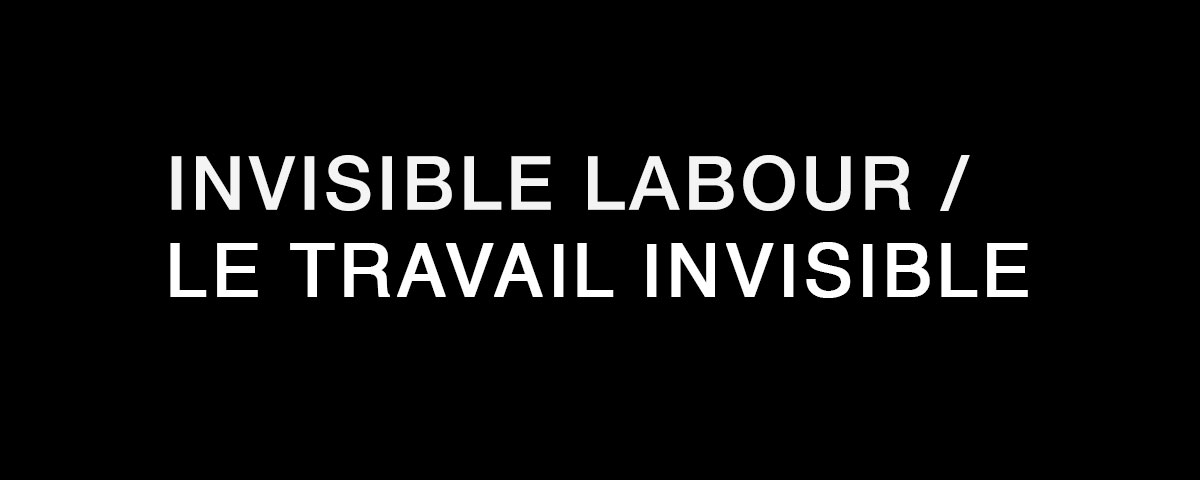Call for Proposals | Programming 2018-2019 : Invisible Labor

Deadline: October 15th, 2017
Invisible labour, both formal and informal, is work that is not seen, valued, paid, or all of the above. Invisible labour is work that is overlooked, ignored, devalued, minimized, or “naturalized” even though it is fundamental for the efficient operation of projects, institutions, households, and entire political entities and organizations. The notion of invisibility can refer to practices and tasks, but also to the workers themselves, who are either completely out of view, or who are physically visible but are nonetheless rendered invisible by employers, consumers, colleagues, friends or family members. Sometimes employees are required to perform invisible work to keep their jobs (i.e, working overtime during rushes), while other times invisible work applies to performing tasks that are not considered work (i.e, caring; emotional labour), or tasks that are socially constructed as something certain people want to perform or are naturally good at performing (i.e, housework for women, farm work or low-wage jobs for racialized people). Significantly, invisible labour is often linked to people and communities who are already marginalized (women, immigrants, racialized subjects, workers assembling technologies in economic developing countries).
Studio XX is looking for creative, critical, funny, ironic, and poetic media arts projects exploring the ways that artists, activists, and cultural workers, adapt, perform, negotiate, or refuse, current forms of invisible labour (emotional, mental or physical). Among other things, we are asking: what forms does invisible labour take? What is the relationship between invisible labour and the art world? What is the role of gender in the visibility/invisibility/hypervisibility of labour? How can artists working with digital technologies counter the unpaid labour that provides content for the internet? Can artists re-imagine projects that undermine capitalism?
- emotional labour, physical labour, mental labour
- unpaid labour, and/or underpaid labour
- sustainable/viable projects vis-a-vis invisible labour
- practices such as thinking, emailing, drafting, researching, writing, planning for events, crowdsourcing, preparing materials, etc.
- disembodied labour, virtual work and non-human labour
- work associated with everyday life (meeting with people, care taking, housekeeping)
- illegal labour
- freelance and independent labour
- hierarchies (e.g. racial, ethnic, class-related) and invisible labour
- reliance of unpaid internships in art festivals, artists run-centres, and other art institutions
- the geographies of invisible labour (certain neighbourhoods, certain countries)
- outsourcing in the Global South and other marginal areas
- invisibility in the digital economy: startup cultures, content farming, content moderation, sharing economies, Twitter bots
- visibility versus “exposure” discourses in the art world (Nicole Burisch)
- invisibility of labour versus the visibility of architecture and infrastructures
- social expectations and invisible labour
- the idea of “personal days” in complement with “sick days” to recognize and compensate invisible labour
Participants may present proposals for Exhibitions, Workshops, or a One-day Event/Activity
Examples of proposals for exhibitions: web art, public interventions, audio and electronic art, interactive pieces, radio art, video art, installation, locative media, game art, augmented or virtual reality, bio art, open source and community-based practices.
Examples of a One-day Event/Activity: conversation, roundtable discussion, or performance.
We seek propositions inspired by (but not limited to) feminism, critical race studies, disability and queer studies.
Submissions will be accepted in either English or French.
Studio XX welcomes project proposals from self-identified women, trans, and/or gender fluid artists, activists, collectives, and organizations.
WHAT WE OFFER
Studio XX offers artist fees based on the CQAM grid.
Selected projects receive artistic and technical support (*to be defined according to each project and available resources).
* Please note this is not a call for projects that require production support. Works submitted must be ready for presentation.
Before submitting a project proposal, applicants are strongly encouraged to consult Studio XX’s mandate, submission guidelines and gallery plans.
SUBMISSIONS GUIDELINES: REQUIRED INFORMATION
1. Personal information
- Name, email, city of residency, phone, website.
- Short biography (100 words max.):
- CV
2. Project Description
- Project title
- Project summary (100 words max.)
- Type of media
- Type of proposed project (exhibition; one-day event/activity; workshop)
- Project description. Please explain how your project is related to the theme: Invisible Labor (500 words max.)
- How is your project related to Studio XX’s mandate? (100 words max.)
- Technical description (materials and technical equipment needed to present your work)
- Special assistance needs (help for set-up, additional people needed for presentation/performance, etc.):
3. Supporting documents
- Images, audio and/or video files of proposed project as well as recent works: up to 10 images, up to 5 video or audio excerpts of 3‐minutes or less (via url links). Please provide password(s), if applicable.
- Description of the material, including: title, location (venue, city, country), year.
Please provide the required information in a PDF file (max. file size 5 MB) and send to appel@studioxx.org
Subject line: Proposals – Programming 2018‐2019
Deadline for submission: October 15th, 2017 at midnight (Montreal time)
Please note that incomplete submissions or submissions received after the deadline will not be considered. All applicants will receive a confirmation of receipt.
Selected participants will be notified in December 2017.
For questions and further inquiries, please contact: info@studioxx.org. Thank you for your interest in Studio XX!
Tips
Please note that Studio XX’s selection committee has a limited amount of time to review each submission. Ensure that your application is complete. Present your information in a clear and organized manner.